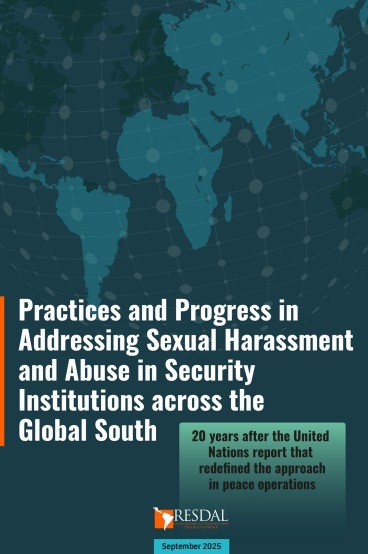
Practices and Progress in Addressing Sexual Harassment and Abuse in Security Institutions across the Global South
20 years after the United Nations report that redefined the approach in peace operations
Editorial:Red de Seguridad y Defensa de América Latina Internacional
Materia:En inglés
Público objetivo:Profesional / académico
Publicado:2025-10-30
Número de edición:1
Tamaño:1,44Mb
Soporte:Digital
Formato:Pdf (.pdf)
Idioma:Inglés
Libros relacionados
The organizational culture in the military and the challenges of sexual harassment and abuse - Chacón, Rosita
Who said CAT? - Cabral Pere, Iris Elizabeth
The Little Big Five (Book 1) - Heyneke, Thean
The Little Big Five (Book 1) - Heyneke, Thean
Reseña
This publication by RESDAL examines the progress and challenges in addressing sexual harassment and sexual abuse within defence and security institutions across the Global South, two decades after the United Nations report that reshaped the international approach to these issues in peace operations.
Developed under the project “Women in Peace Operations: Supporting Inclusive Environments through Interregional Collaboration and National Engagement”, with the support of the Canadian Ministry of Foreign Affairs, the study covers four regions—Africa, Latin America, Asia, and MENA—and analyzes twenty country cases: Argentina, Bolivia, Brazil, Cameroon, Chile, Colombia, Dominican Republic, Ecuador, Egypt, El Salvador, Guatemala, Honduras, India, Mexico, Nigeria, Pakistan, Paraguay, Peru, Türkiye, and Uruguay.
The report approaches sexual harassment and sexual abuse as issues that, while related to gender policies, require specific and tailored responses. It situates them within a broader organizational and cultural framework, addressing factors related to institutional ethos, motivation, and professional environments in the military and police sectors.
Drawing from field research and the experiences shared during the 2024 international seminar Women in Uniform and Peace Operations: Advances and Challenges in Creating Safe Environments—organized with REBRAPAZ and hosted by the Brazilian Army’s Land Operations Command (COTER)—the report provides preliminary comparative findings.
Its contribution lies in offering an interregional and comparative perspective on how institutions in the Global South are responding to sexual harassment and abuse, highlighting both institutional progress and persistent gaps. The publication serves as a reference for policymakers, researchers, and practitioners seeking to strengthen safe and inclusive environments within the security sector.




